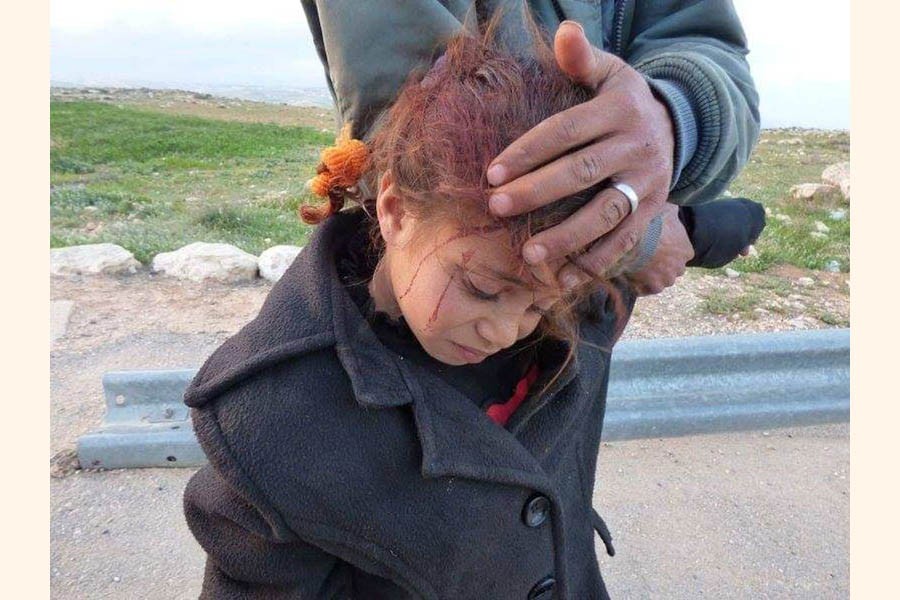
Published :
Updated :

Sujoud is 12, and she tells the camera, matter-of-factly, about a man who approached her and her friends in a threatening manner as they walked to school in the adjacent village of A-Tuwani, in the West Bank South Hebron Hills. When she was 6, she suffered head injuries when she was assaulted by masked men. When asked if she still thinks about what happened then, she replies: Sometimes. Not always.
The indicted prime minister was ousted and the demonstrators outside his home have left, but Sujoud is still waiting for us to wave the black flag of the protest movement for her. Volunteers from the human rights organisation Machsom Watch invited me to see the latest injustice in Sujoud's corner of the West Bank - concrete barriers placed at the entrance to A-Tuwani during Israel's latest round of violence against Hamas in the Gaza Strip. The army did not make do with this, and it deployed a Caterpillar D9 armored bulldozer that made the rough dirt road impassable.
A-Tuwani is one of a group of Palestinian villages whose residents have been attacked recently by Jewish settlers, with the active encouragement of the Israel Defense Forces. On Jun3 26, settlers set fire to an agricultural outbuilding and caused head injuries to one person. The rioters rampaged undisturbed, and were filmed as they prepared to leave the area in a waiting minibus. A video shows them throwing stones at villagers while Israeli soldiers stand idly by. Unlike Sujoud's assailants, these were not masked. Some wore white dress shirts, as if taking part in some monstrous Oneg Shabbat.
All of this is known and familiar, as is the story of Sujoud, whom I met during my visit. There is nothing new here. Nevertheless, she is everyone's daughter, and we are all her parents. Since 2004, the army has escorted children from her village, Tuba, to their school in A-Tuwani, to protect them from settlers from the HavatMaon settlement outpost. When the soldiers slack off, this daughter of ours is threatened and attacked. When they are late, she misses a class.
In the 1970s the state declared the area where she lives a firing zone, and in 1999 the inhabitants were expelled from their homes. They were returned only on order of the High Court of Justice, but to this day the state refuses to connect the villages to the electricity grid, and every day it commits war crimes by denying Sujoud access to water - a basic right to which even settlers who reside there illegally are entitled. To fetch containers of water, her father drives a tractor pulling a trailer, an hour and a half in each direction, after settlers from Havat Maon blocked the short route.
This is the same road that is blocked to his daughter, forcing her to walk miles every day. She will see more illegal settlements sprout, connected overnight to utilities by a hidden hand. And she will not be allowed to protest. In January, a soldier shot and severely wounded a young man in a nearby village, during an attempt by the army to confiscate a generator. According to reports, the man tried to grab the precious object from the soldier.
Language, names and concepts have been expropriated from Sujoud. Along the road from the Meitar crossing are large signs bearing the names Carmel, Maon, Susya and Avigail. Outposts in which only hundreds of people live are disguised as big cities, while it is as if the tens of thousands of residents of the cities of Yatta and Dahariya, whose scattered homes fill the landscape, in plain view of the traveller, do not live anywhere. If the signs are to be believed, the population has already been transferred.
Sujoud has no grip on the future while her childhood is being stolen from her, not only by the violence being inflicted on her but also by our persistent refusal to look at her. In Israeli eyes, she will never be a unique individual - adorable, glowing. The case of Eyad Hallaq momentarily cracked the wall of indifference - he was a young Palestinian man with autism, an overgrown child, who was shot dead in the Old City of Jerusalem by a police officer who has since been charged with manslaughter - but compassion is inevitably a short blanket.
It could be said that this is the natural distance between an individual and the enemy's children. Sujoud, however, is not an enemy but rather a subject who has no rights. She is our daughter, collectively. And the truth is that no sanctions threaten anyone who commits crimes against her. "When the crimes pile up," wrote Bertolt Brecht, "they become invisible." This is the bottomless corruption against which the cases against the former prime minister pale.
The piece is excerpted from The Haaretz (www.haaretz.com)


 For all latest news, follow The Financial Express Google News channel.
For all latest news, follow The Financial Express Google News channel.